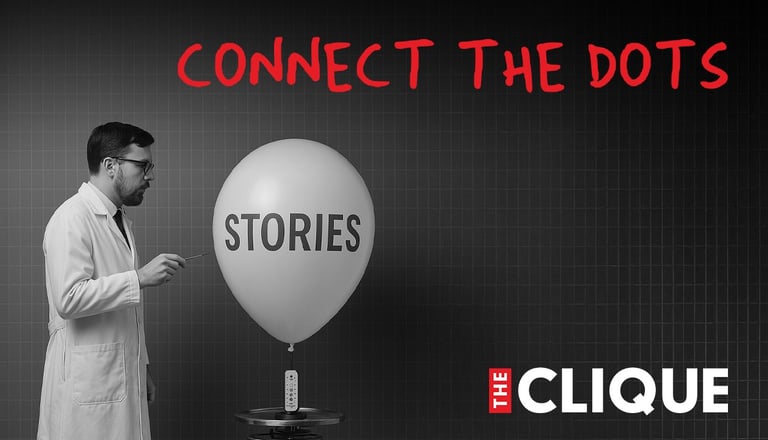Connect the dots.


// Introduction
Writing this blog every week has been somewhat of a revelation for my brain - it's allowed me to connect the dots and create stories in ways which were not previously possible. We live out our lives in a dot to dot fashion, moving from one dot to another and slowly but surely our lives form a picture of who we are but when you write, you're able to connect the dots in a less linear way.
When you write stories, you're able to see how dots connect in a less straightforward way - there is a famous Steve Jobs quote which I remember about 'you can only connect the dots looking backwards' and it's true - we have tiny, disconnected moments that quite often, don't make sense in real time but if you give yourself a little distance, suddenly there is a story there.
The thing is, when you write and you're constantly trying to find a way to express yourself, you find new and unique ways to connect the dots and it's a muscle that is constantly being worked on, so it's constantly adapting and you find new ways to tell a story.
// Everything can be a story.
If you’ve ever told someone about a strange dream, a weird coincidence, or how your coffee order got messed up then you’re a storyteller. You just need to refine the lens and use these stories to your advantage.
We often think stories need to be epic - something as grand as a life-or-death moment, a career change or something as glamorous as a fall and a glorious comeback but in all honesty. most of the stories that actually connect with people? They’re smaller. Softer. More real.
It could be a forgotten email that finally got replied to five years later, a wrong turn that led to an unexpected place or (as I cleared out my cupboard under our stairs this weekend) an old pair of shoes that reminded me of the last time I wore them (coincidentally, it was many, many years ago).
None of those things are stories on their own. But when you stop and link them to meaning - that’s when they become something worth sharing and thats what writing every week can do for you.
The wonderful thing about life is that we’re living through story worthy material all the time - we just don’t always realise it. Partly because we’re too close to it. And partly because we’ve been taught that a story has to be neatly packaged and have a moral - if you watch any Youtube video on 'story' - they always talk about the 3 acts or the hero story.. they don't all have to follow that narrative (although it does help if they do).
Sometimes, a story is just a moment that meant something to you. A flicker of emotion, a change in perspective or a quiet shift. You felt it - and maybe that’s enough to share it because it might just mean something to someone else?
Whether you’re building a brand, writing a newsletter, or just trying to show up as a human in your work, this is the gear shift that changes everything:
You stop performing stories.
And start noticing them.
// Connecting my own dots.
When I started writing The Clique, I didn’t really have a plan. I just knew I wanted to show up consistently and say something honest. Some weeks I had a clear idea, other times, I’d sit there staring at a blank screen thinking, what am I even trying to say here? (still happens sometimes).
But over time - dot by dot - I've noticed something shifting.
Little moments that would usually pass me by have started to stick. A line from a podcast, a weird dream, a passing comment from someone in the queue at Tesco. I started catching them. Noticing them. Holding onto them long enough to ask: Is there something here?
My notes app on my iPhone has started to fill up with little ideas - they all mean something and the most important thing is that I now have a little bank of ideas to call upon.
It’s not that my life suddenly became more interesting, It’s that I started to train my brain to look at everything differently. I wasn’t just living the moments - I was turning them over, shining a light on them, connecting them to something bigger. Even if that “something” was just a feeling or a lesson or a question I hadn’t quite answered yet, I just became a little more inquisitive and I was able to pull ideas together.
One week I wrote about something my daughter said whilst watching a movie and another week, I'm writing about a little frustration in how someone is going about building a 'community' - None of it felt huge or profound - but by the end of each post, I realised I had something that felt like me. Something that carried a bit of weight. And I knew, if I was feeling it, someone else probably was too.
That’s how storytelling has changed for me.
Not by waiting for the big stuff., but by noticing the small stuff - and being brave enough to say, this matters to me.
Because once you admit that, it starts to matter to other people too and thats the whole point of having a clique.
// Why that shift matters.
The more I write, the more I realise that storytelling isn’t about being dramatic or polished - it’s about being tuned in. It’s about paying attention to the stuff most people scroll past. The ordinary, everyday moments that quietly shape how we think, feel, and move through the world.
When you start noticing those moments, you change the way you see everything and when you start writing about them, you change the way others see you.
You’re not just someone with thoughts. You’re someone with something to say.
In a world that’s constantly shouting, curating, and faking depth for the sake of engagement or even worse, using AI to generate the same old bland output, you have to realise that being able to say something real, that’s your edge - thats the difference maker.
It's a superpower. It doesn’t have to be perfectly packaged. It just has to be true.
That’s what writing The Clique has taught me. Not how to be a storyteller in the classic sense - but how to be a better observer. How to notice the moments I’d usually dismiss and how to give shape to thoughts that were floating around without form. It sounds a little airy fairy in places but I want you to realise that the most important thing is how you can share them in a way that might make someone else stop and think, “Yeah… I feel that too.”
That’s why this shift matters. Not just for me - but for anyone trying to connect with others, build something meaningful, or just show up more honestly in what they do.
Because when you stop trying to perform a story… and just start living into it... People can feel the difference.
// Why that shift matters.
So much of storytelling is just about paying better attention - To yourself, to the moments that stir something in you, to the things that don’t always make sense at the time, but leave a little mark anyway.
The truth is (and as I type these words, I'm conscious that 'the truth is' is a very AI sounding statement but bear with me) - you don’t need to wait for something bigger to happen.
You don’t need the “perfect” story.
You just need to start with a moment that felt like something.
Because when you learn to catch those little moments - and give them a bit of shape - you’re not just connecting the dots of your own life, you’re giving someone else a thread they might not have known they needed.
That’s the beauty of this whole thing. The more you write, the more you notice, the more you notice, the better you connect and the better you connect, the more human it all feels.
So I want to leave you with something to think about - What’s one thing from your week that felt odd? Out of place?
It could be something small, something you can’t quite shake.
Write it down. Give it a little space.
And just ask: Is there a story in this?
Chances are… there is.
You’ve just got to connect the dots.


